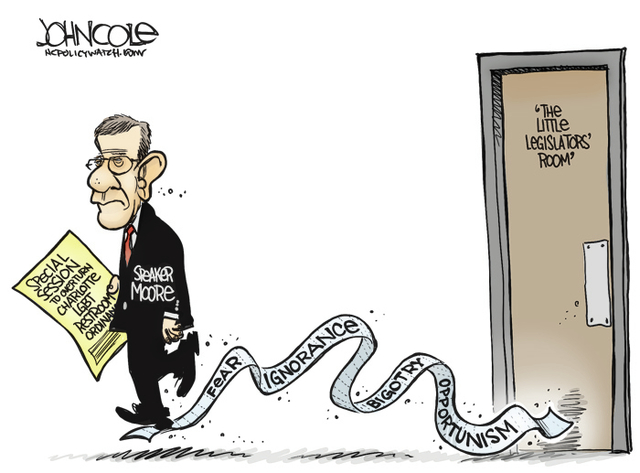Enough already.
North Carolina is not an outlier. More than 30 anti-transgender bathroom bills have been proposed since the first of the year, and this week the shameless carnival came to my not-so-red state of Minnesota. Locally, the proposal stands little chance of passing the legislature and none of escaping the Governor’s veto, but such pragmatic considerations were insufficient to prevent high-profile hearings, during which Republican sponsors publicly equated transgender women with voyeurs, pedophiles and rapists. As is often the case in election years, the viability of legislative proposals is beside the point. Of course they are delighted when a bill succeeds, but the viral proliferation of anti-trans proposals is more about messaging:
Fear not, culture warriors. Stick with us through one more election. Marriage equality was a setback, not a loss. The front may have shifted, but the larger campaign goes on.
2016 is open season on transgender Americans.
The ostensible justification for banning transgender people from restrooms corresponding to their identity is the privacy and protection of women and children. Opening the bathroom door to transfolk will, we are told, unleash salivating hordes of predators and peeping toms upon unsuspecting innocents. To be sure, protecting the vulnerable whenever possible is certainly a right and proper function of government; it simply has nothing whatsoever to do with the bills in question. Transwomen have been using women’s restrooms all along. There have been no reports of either transwomen harassing others in the privy, nor of non-transgender predators posing as transwomen to gain access to the Ladies’. Where was the public safety crisis in 2010? 2005? 2000?
Further, every danger imagined by opponents of transgender bathroom access is already a crime. Harassment, indecent exposure, assault, invasions of privacy, rape–all are fully prosecutable under existing statutes, and a transgender person committing such acts would face the same consequences as anyone else committing such an act. Creepy behavior in a public restroom is illegal because it is creepy behavior, not because of who does it.
The implication of anti-transgender bills is that transgender people enter public restrooms as predators. There is simply no evidence for this. We go to pee, and the facilities already equipped with private stalls, in which the chances of seeing anyone else in a state of undress is essentially zero.1 We do not go to to make a sociopolitical statement, but rather to relieve ourselves so that we can get back to what we are doing as soon as possible. We are not–I must stress–not, “men in the ladies’ room,” because we are not men. The genitals that we were born with demonstrably do not prevent us from acting in a civilized manner toward others, and whether or not we have left them surgically unaltered is frankly none of anyone’s business. They are called private parts for a reason.
All of you, both men and women, have shared public facilities with transgender people many times in the past. Most of the time you probably didn’t notice, and in any case you were done no harm. Nevertheless much harm can come to transgender people and others when they are forced, as the bills prescribe, to use the bathroom associated with the sex on their original birth certificate. It was not only because I was being ridiculed and occasionally threatened in the men’s room that I switched. Some men who encountered me would visibly panic when I walked in, whether they were sure I was in the wrong place or worried that they were. The nicest confrontation I recall was a guy who was walking out as I was walking in. As he saw me, he froze, checked himself, then said. “Miss? You’re in the wrong room.”2
I quite agree. However, what seemed obvious to both that poor guy and me is lost on an increasing number of conservative politicians. They are not seeking to protect the privacy of women,3 but rather to make it legally difficult for us to function socially or professionally. Their seething, absurdist rhetoric casts little doubt that they see us as delusional sociopaths. Don’t be misled by them, my friends. Dehumanizing transgender people does not make anyone else safer. It just makes us feel like shit.

